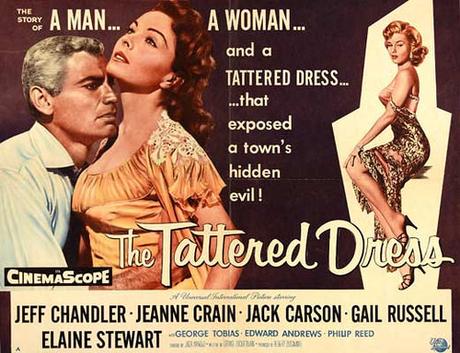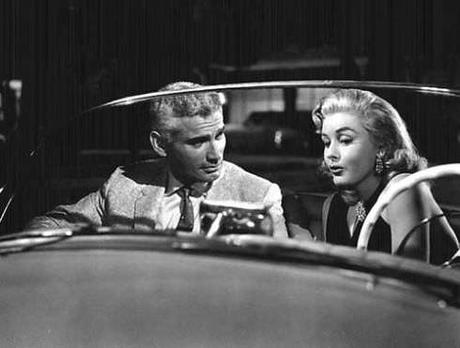
Ever wondered how films end up neglected? I was almost going to say "lost" but that's an entirely different category; I mean movies which are viewable, accessible with a bit of effort, but neither commercially available nor presented in optimum condition. By the way, I'm not offering any answers here. I'm very bit as mystified as the next guy, and I'm really only indulging in a bit of idle musing after watching a less than perfect version of The Tattered Dress (1957). You could argue that the cast is largely peopled with actors who have drifted a little too far out of the public consciousness, although I'm not wholly convinced by that one myself. Regardless of that, the film was directed by Jack Arnold, a cult favorite if ever there was one, and yet this work remains (apparently) unrestored and stubbornly unreleased.
Cinema sometimes feels like the theater of the senses, or maybe a more sensual version of the theater. If we lose the immediacy of the live performance, we also gain something in extreme intimacy, and then in an instant we can also achieve the cool distance of an observer in a gallery. And all the while our senses are targeted and stimulated, particularly our vision and hearing. I've come to think that film sequences without dialogue - not silent film, just with the dialogue stripped out - come closest to pure cinema, storytelling predominantly through visuals, music and ambient sound. The Tattered Dress opens like this: with a torn frock, a breathtaking blond racing through a desert night in an open top convertible, a tense meeting with her husband, another ride and then a cool and clinical killing. And not a word spoken.
That's the setup, a late night killing, a crime of passion by a shooter who needs a sharp lawyer to do the defending. That lawyer is James Blane (Jeff Chandler), famed for his ability to defend the indefensible and the bane of district attorneys everywhere. Blane is blunt, cocksure and beholden to one creed only, the need to win, to succeed and feed the legend of his own ego. His courtroom wizardry has seen him scale the peaks of his profession while he's sacrificed his personal satisfaction to attain it. If his wife maintains an arm's length relationship and his children are rarely seen, well so be it. He gets his clients off, and he gets this latest one an acquittal too, shredding the reputation of a small town sheriff on the way. However, this is only part of the story, and Blane's moment of triumph is an imposter, disguising a comedown that will shake his faith in himself to the core. Yet perhaps he'll learn something about himself in the process.

Jack Arnold is held in high esteem, and rightly so, for the Sci-Fi films he made in the 1950s. Those films, such as It Came from Outer Space and the excitingly cerebral The Incredible Shrinking Man, were landmarks not only for that genre but for genre filmmaking as a whole. Still, it would be a mistake, and a disservice to the man, if one were to classify him on those terms alone. Tucked in among his credits, one can find a brace of what I'm happy to assert are classy and superior examples of tight and economical western cinema - and . Also, around the same time, Arnold was making (along with Jeff Chandler as it happens) where he took aim at small town corruption and racism. Here, under the guise of a slick legal thriller, he cast a sideways glance at the American Dream.
I'd like to think the desert setting, which Arnold seemed drawn to on a number of occasions, has some significance. Is it too much of a stretch to view that harsh and bleak backdrop as a kind of blank canvas upon which he felt greater freedom to explore his themes? Because he does dig under the surface of the glossy 50s American success story - the hotshot lawyer stirs urban/rural and western/eastern hostilities right from the beginning, and his idealized family unit (not to mention that of his smooth and wealthy clients) is shown to be anything but ideal. In short, there's a nasty bit of corrosion creeping in beneath the chrome trim. The broken home and tarnished ideals of the man are the price he has paid in his ruthless pursuit of fame and fortune, elbowing such trifles as truth and justice aside in his dash for a questionable prize. So, at this point, let me make a proposal - that Arnold was every bit as concerned, all through his Sci-Fi, western and thriller work, with a critical examination of the flaws and barely suppressed crises of the post-war American soul as the more critically acclaimed Douglas Sirk. While this is something I've pondered before, I'll freely admit that this George Zuckerman scripted production hauled it all front and center for me - Zuckerman also wrote a number of screenplays for Sirk, including the perennially underrated The Tarnished Angels.
Now, a brief word on the performances. Jeff Chandler's early death robbed the cinema of one of the most promising talents of the era. It has also led to an under-appreciation of his talents and abilities, but a look at any of his best roles quickly highlights his powerful screen presence. Plenty of actors, especially leading men in their prime, are and were loath to accept what might be perceived as unsympathetic roles. Chandler, however, seemed comfortable enough taking on less than wholesome parts. The lawyer here is not a nice man, he's a grasping and ruthless type who has lost his way, and yet Chandler embraces this negativity and offers a welcome three-dimensional portrait of ambition colliding with a hunger for personal fulfillment. Facing off against him is Jack Carson, the butt of plenty of jokes as a character player. His bulky joviality is nicely subverted here and his cool undermining of Chandler is very memorable. Jeanne Crain is the estranged wife, still in love with Chandler but proud enough to hold herself back until he rediscovers his humanity. And finally, there's Gail Russell, that fragile beauty in the middle of a temporary comeback that was destined to be short-lived.
To finish this piece, which has ended up running slightly longer than my other recent postings, let me just reiterate that The Tattered Dress is a classy melodrama/thriller with a fine cast and on-form director. That it remains unreleased on any current home video format is something I struggle to understand. There are many films we can safely say are deserving of a high quality digital release - this is most assuredly one of them. I can only hope someone sets about rectifying this oversight soon.
